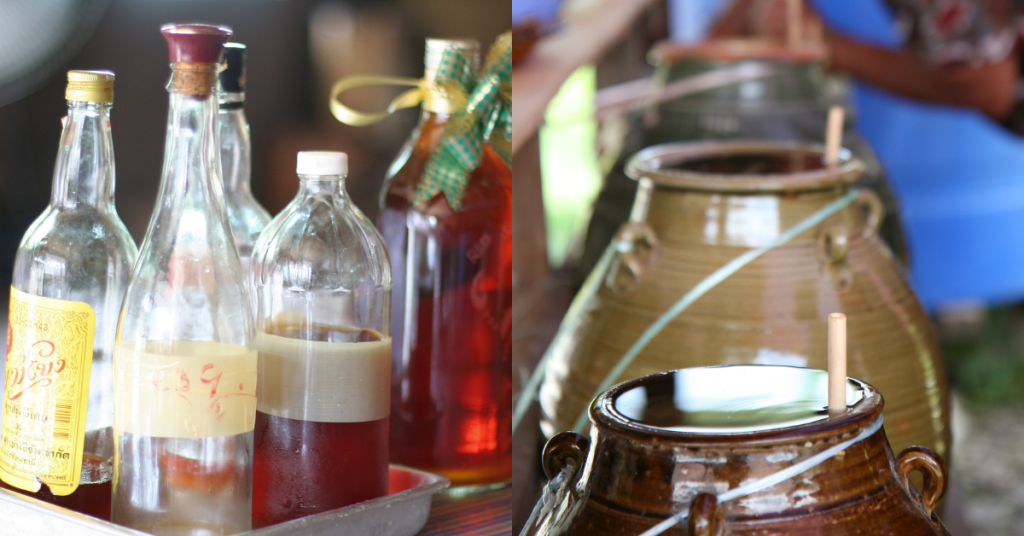Whether or not you’re someone who drinks alcohol, chances are you’ve probably heard of tuak.
For those uninitiated, tuak is homemade rice wine that’s a staple in Sarawak’s Dayak community. This includes different ethnic subgroups such as Iban, Bidayuh, and Kenyah.

A version of rice wine called lihing is popular amongst the Kadazan-Dusun people of Sabah. In general, these rice wines are made by fermenting glutinous rice, yeast, and sugar for a few weeks. More adventurous brewers might add fruits to the mixture, like pineapple, barley, and roselle.
This process could even extend for a few months depending on the person’s preference. The longer you ferment it, the sweeter it’ll taste.
It’s an especially popular beverage during the local harvest celebrations like Gawai Dayak in Sarawak and Kaamatan in Sabah. Each family or tribe typically has their own blend of concoctions for personal consumption.
These days, tuak and lihing have grown and broken out of the indigenous sphere. You can find them being sold to local bars to be added into cocktails, or even sold as is.
However, considering its homemade nature, this brings in the question of its legality.
Are there any laws in Malaysia that regulate its brewing? And are there any laws in Malaysia that regulate its selling?
Laws in Malaysia that regulate the brewing
According to Excise Act 1976, Part IV. 21(3) as stated in the Laws of Malaysia:
“No person except a licensed manufacturer licensee shall knowingly keep or have in his possession any still, utensil or other apparatus for distilling, fermenting or otherwise manufacturing dutiable goods.”
This basically means that nobody in the nation can have the tools needed to create anything that is taxable. Unless you’re a licensed manufacturer, of course.
Examples of dutiable goods are items such as tobacco, medicine, and alcohol.
However, there are exceptions to this.
In Excise Act 1976, Part IV. 22(1), it’s stated that:
“Nothing in this Act shall apply to any distillation of dutiable goods by (a) a pharmacist, (b) a registered pharmacist; or (c) a qualified chemist with the approval of the Director General where such distillation is proved to the satisfaction of the Director General to be for genuine medical or scientific purposes.”
So if you’re a pharmacist or qualified chemist that’s been approved by the Health DG, you’re exempted from the previous law.
But wait, there’s more.
Following that, Part IV. 22(2) states:
“Nothing in this Act shall apply to any native (a) knowingly keeping or having in his possession any utensil, other than a still, for manufacturing; or (b) manufacturing, other than by distillation, any native liquor for his own consumption.”
In the context of Malaysian Law, “native liquor” refers to any liquors customarily fermented, made, or prepared by natives in Sabah and Sarawak.
So the local governmental bodies do recognise that tuak, lihing, and other homemade alcoholic beverages are integral to our indigenous communities. And also understand its significant roles in cultural events, like prayers and blessing ceremonies.
This means that brewing it at home for yourself is not a crime in any way, provided that you’re an indigenous person.
Laws in Malaysia that regulate the sale
That said, if you’re looking to ferment your own rice wine to be sold, that’s an entirely different matter.
Regardless of your ethnicity, nobody is allowed to create dutiable goods at home or in another establishment for the purpose of selling. So you can’t make your own cigarettes, medicine, or liquor to be sold, unless you have the proper licences that are required.
This is further reiterated in Excise Act 1976 as well.
It’s stated in Part VII. 32(1) that, “No person shall sell by retail, or offer for sale by retail, any intoxicating liquor whether for consumption on or off the premises of the vendor except under and in accordance with a licence issued under this Part and in a place specified in such licence.”
Unless it is with regard to:
- (a) the sale by retail of beer or toddy in unopened bottles having their proper seals and capsules intact or in unopened cans;
- (b) in the case of Sabah, to a native selling by retail or offering to sell by retail any native liquor which is not a distilled liquor; or
- (c) the sale by retail of intoxicating liquors in duty free shops licensed under section 65D of the Customs Act 1967.
This means that it’s technically legal for an indigenous person to sell native liquor in Sabah without a licence, as tuak and lihing are technically classified as undistilled liquor too.
Dictionary time: Undistilled liquor refers to alcohol produced by mere fermentation of raw material. This includes drinks like wine and beer.
Source: Alcohol Rehab Guide
However, this does not extend beyond the borders of Sabah. So if you’re selling it in Sarawak, or even Semenanjung Malaysia without the proper licences, you are considered to have committed an offence under the law.
-//-
Putting it simply, local indigenous persons in Malaysia are permitted to create their own homemade native liquor like tuak and lihing as for their own personal consumption. Before they sell it, they will need the appropriate licences, but it seems as though this rule is an exception in Sabah.
To be on the safe side though, it would be better to assume that permits and licences are needed for any sort of sales occurring in Malaysia, whether they’re dutiable goods or not.
- Read other articles we’ve written pertaining to Malaysian law here.
Featured Image Credit: suehani via Flickr